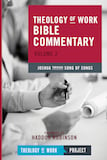Restoration of Covenant Life, Phase One: The Work of Ezra (Ezra 7:1-10:44)
Bible Commentary / Produced by TOW Project
Ironically, Ezra himself does not appear in the book bearing his name until chapter 7. This learned man, a priest and teacher of the law, came to Jerusalem with the blessing of the Persian king Artaxerxes over fifty years after the rebuilding of the temple. His assignment was to present offerings in the temple on behalf of the king and to establish the law of God in Judah, both by teaching and by appointing law-abiding leaders (Ezra 7:25-26).
Ezra did not explain the king’s favor in terms of good luck. Rather, he credited God with putting “such a thing as this into the heart of the king” to send Ezra to Jerusalem (Ezra 7:27). Ezra “took courage” and acted on the king’s order because, as he said, “the hand of the Lord my God was upon me” (Ezra 7:28). This language of God’s hand being upon someone is a favorite of Ezra, where it appears six times out of eight times in the whole Bible (Ezra 7:6, 9, 28; 8:18, 22, 31). God was at work in and through Ezra, and that explains his success in his endeavors.
Ezra’s confidence in God’s help was tested when it came time for his entourage to journey from Babylon to Jerusalem. “I was ashamed,” Ezra explained, “to ask the king for a band of soldiers and cavalry to protect us against the enemy on our way; since we had told the king, ‘The hand of our God is gracious to all who seek him, but his power and his wrath are against all who forsake him’” (Ezra 8:22). For Ezra, to depend on a royal escort implied a failure to trust in God’s protection. So he and his retinue fasted and prayed rather than seek practical assistance from the king (Ezra 8:23). Note: Ezra was not following any particular Old Testament law in choosing not to receive royal protection. Rather, this decision reflected his personal convictions about what it meant to trust God in the real challenges of leadership. One might say that Ezra was an “idealistic believer” in this situation, because he was willing to stake his life on the idea of God’s protection, rather than to ensure protection with human help. As we’ll see later, Ezra’s position was not the only one deemed reasonable by godly leaders in Ezra and Nehemiah.
Ezra’s strategy proved to be successful. “The hand of our God was upon us,” he observed, “and he delivered us from the hand of the enemy and from ambushes along the way.” (Ezra 8:31). We do not know, however, if members of Ezra’s party carried weapons or used them for protection. The text seems to suggest that Ezra and company completed their journey without a threatening incident. Once again, the book of Ezra shows that human efforts are successful when God is at work in them.
The last two chapters of Ezra focus on the problem of Jews intermarrying with Gentiles. The issue of work does not emerge here, except in the example of Ezra, who exercises his leadership in faithfulness to the Law and with prayerful decisiveness.












